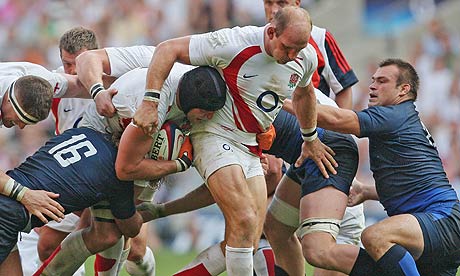
The European unions have enjoyed little success against their southern hemisphere rivals on the field in recent years, but they relished a notable victory in the conference room yesterday. The most contentious of the experimental law variations, including maul collapsing, downgrading most offences to free-kicks and abandoning the restriction on numbers in the lineout, were rejected and will not make it into the law-book.
Even though the conference on the variations, which was held this week at Lensbury Club, recommended that 10 of the variations, the majority of them of little consequence, become law next month it was a considerable defeat for the International Rugby Board which has spent the last four years championing the ELVs.
The Board was told to look at the way it handled proposed law changes in the future with a number of delegates concerned at the number of variations that were included in the trial as well as the pressure exerted by the IRB on unions to get them into the law book.
Once the Board's council debates the recommendations from 13 May, no law changes will be proposed until after the 2011 World Cup. The only two variations likely to be made permanent are the ones banning a direct kick to touch if a player receives the ball from a team-mate outside his 22 and having a five-metre off-side line at a scrum.
But even in defeat, the IRB released a statement that said 10 variations had been approved by delegates while three had been rejected. It said that the ELVs governing sanctions, which turn most offences into free-kicks, had been referred for further examination. The conference threw out the sanction variations, not just those which have been trialled in the southern hemisphere, which see free-kicks awarded to the opposition if a team fails to recycle possession at rucks and mauls as well as make most offences punishable by free-kicks, but also those variations that were last year referred back to the Board's laws project group.What the 59 delegates did agree was that the IRB should look closely at the rules governing the breakdown area. While rucking will not make a return, it was agreed that the tackle area should be a true contest for the ball, not a means for the attacking side to recycle possession, and the defending players should be given time to force a turnover, as long as they stay on their feet.
The final decision will rest with the Board's council, which meets on 13 May when it will consider proposals for its rugby committee which is chaired by the former New Zealand captain, Graham Mourie, but Australia were the only country to support the variations unequivocally yesterday with New Zealand offering qualified support. England led the opposition and their proposal that the maul, lineout and sanction variations be abandoned prevailed.
If the recommendations are agreed they will come into effect on 1 August, so the Lions tour to South Africa in June and July will be played under the variations currently being trialled globally. "The whole idea of the ELVs is to improve the sport and while we support the majority of the globally trialled variations, the feedback indicates that pulling down the maul and unrestricted numbers in the lineout have not improved the sport," said Chris Cuthbertson, the chairman of the RFU's ELV task group.
The RFU's proposal that the half-time interval be increased to 15 minutes will also be debated next month along with a suggestion that rolling substitutions be permitted in the amateur game. France's demand that something is done to stop uncontested scrums will also be considered by the Board's laws committee.

